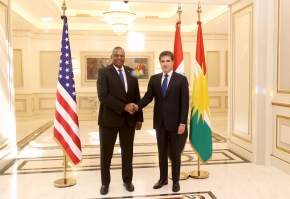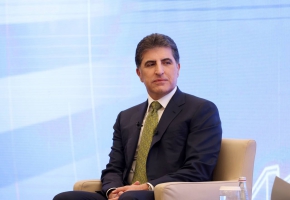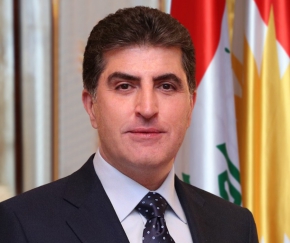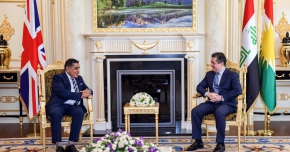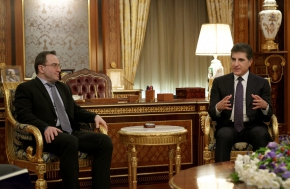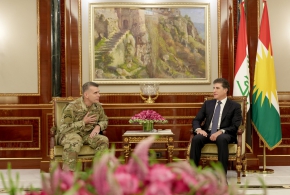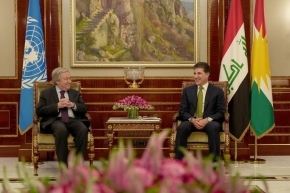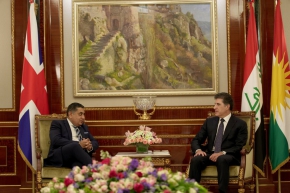main user
Erbil, Kurdistan Region, March 7, 2023
President Nechirvan Barzani received United States Secretary of Defense General Lloyd Austin and his accompanying delegation in Erbil today.
In a meeting attended by the Vice Presidents of the Kurdistan Region and senior officials of the Peshmerga Ministry, US relations with Iraq and the Kurdistan Region, the security situation in the country and the latest developments in the fight against terrorism, Erbil-Baghdad issues, and the internal situation in the Kurdistan Region were discussed.
General Austin praised the role of the Peshmerga in defeating ISIS, reaffirmed the US support for Iraq and the Kurdistan Region, and pointed out that the US attaches great importance to the process of reform and reorganization of the Peshmerga. The Secretary of Defense pledged all necessary support to the unification process of the Peshmarga according to the Memorandum of Understanding between the Ministry of Peshmarga and the Pentagon.
Both sides agreed that terrorism and ISIS remain a real threat in Iraq and Syria, and Iraq and the Kurdistan Region still need the support of the United States and the international coalition to fight the terror networks. They also agreed on the importance of working together in the region to maintain regional peace and stability.
President Nechirvan Barzani reiterated the Kurdistan Region’s appreciation for all US assistance and support to the Kurdistan Region, and commended the contribution and role of the US military teams in the process of reorganizing the Peshmerga. The President stressed that despite the obstacles, the reform process will be carried out.
The US Secretary of Defense expressed his country’s support for the dialogue to resolve the issues between Erbil and Baghdad and encouraged the political parties in the Kurdistan Region to come together and resolve their issues.
The two sides also discussed the latest developments in the region and other issues of common interest.
After the meeting, President Nechirvan Barzani and the Secretary of Defense Lloyd Austin gave a press conference about the contents of their meeting.

https://presidency.gov.krd/en/president-nechirvan-barzani-meets-with-us-secretary-of-defense-general-lloyd-austin/
Erbil, Kurdistan Region, March 2, 2023
President Nechirvan Barzani attended the second edition of the annual Erbil Forum on Thursday. A number of high officials, academics and research centers from the Kurdistan Region, Iraq and around the world also took part at the annual gathering.
The President participated in a special discussion at the forum and responded to questions about the political and economic developments in the Kurdistan Region and Iraq. The following is a readout of the discussion:
Question: You visited a family that was a victim of the earthquake in Turkey and lost a few family members as a result of the disaster. I’d like to know how you felt as a president who visited victims.
President Nechirvan Barzani: Thank you very much for this opportunity and invitation. I welcome all the guests who are present here today. Like any human being, the scene we saw in a disaster in Turkey and Syria was truly distressing for everyone. The KRG did not hesitate to cooperate instantly from the first moments after the earthquake. The ministry of interior, civil defence, the ministry of health, the private sector in the Kurdistan Region and the Barzani Charity Foundation truly did something that we must all be proud of. When we went under the tent, a family were there who had lost most of their family members; it was indeed something heartbreaking to see. I hope that is their last hardship and that the damaged areas will be repaired as soon as possible. I would like to repeat that we are very proud of the work done by the KRG institutions, the private sector, and the Barzani Charity Foundation.
Question: In 2022, what I noticed was that most of your visits and meetings were more internal and within Iraq, but in 2023, they were mostly abroad. What is the reason for this?
President Nechirvan Barzani: We are working on two dimensions: internal and external. Whether as the Kurdistan Region, or as Iraq, conferences are an opportunity for the Kurdistan Region to show its vision of how to solve Iraq’s internal problems and those of Kurdistan’s. In this context, we had numerous good meetings in Munich with senior officials of the countries and we explained the Kurdistan Region’s view to other countries. What I realized was that today Iraq, in general, and the Kurdistan Region within the framework of Iraq, are being paid attention to deeply. Iraq’s stability will affect the stability of the region in general, and the Kurdistan Region can play a good role in that stability with Iraq. In my opinion, the strengthening of the Kurdistan Region is not a threat to Iraq and the strengthening of Iraq is not a threat to the Kurdistan Region, but they are complementary to each other. We look at it as we have two homes, but we have one state, which is the state of Iraq. In this context, the Kurdistan Region has tried to talk to foreign countries in all aspects, according to the constitution and its political opinion. At this time, the issue of the Russia and Ukraine war is generally the main topic in the world, but what I have seen does not mean that Iraq is not paid attention to. Countries now see Iraq in a new phase and look at Iraq as an economic revival and as a political revival. They see Iraq’s role as a very important role. In this context, the Kurdistan Region can help achieve peace and security in the region and Iraq.
Question: What did you notice at the Munich Conference? Is the West, which has directed world politics for nearly 200 years primarily, reviewing its relations with the outside world? If so, where are the Kurdistan Region and Iraq in this review?
President Nechirvan Barzani: Of course, after the Russian-Ukraine war, it is now felt that there is a serious review of all issues around the world. At the Munich conference, it was very clear that powerful countries were looking for a new alliance and that countries were now organizing themselves on this basis: new times for a new alliances. In my opinion, Iraq can play a major role in this matter. Note that Iraq, including the Kurdistan Region, can play a key role in solving western countries’ problems in terms of energy. For a long term, all their focus was on Russia, but now this may change. In this context, Iraq (including the Kurdistan Region) is a country that can play a serious role in the world’s energy, if it has a clear and serious view. I think there is a golden opportunity for the Kurdistan Region and Iraq.
Question: Is it easy for Iraq and the Kurdistan Region to maintain a balance between the different blocs that are about to be formed in the world and the region?
President Nechirvan Barzani: So far, I think Iraq has done very well, meaning that the framework of Iraqi politics is to become a bridge of communication. The Foreign Minister of Iraq, who is sitting here, has made a serious effort to play a role for Iraq, and the countries of the region, foreign countries and the international community are looking at Iraq’s role with great respect and would like it to be a bridge of communication. In my opinion, Iraq cannot be part of these blocs, but it can be a bridge to the convergence of these parties, and Iraq has played this role so far and has been able to do so to a good extent. I hope it can continue to play this role in the future.
Question: Was the shock of (fall of) the currency in Iraq the result of a political shock or was it just an economic issue?
President Nechirvan Barzani: You should have asked this question to Fuad Hussein, the Iraqi Foreign Minister who is sitting here. He went to the U.S. and came back. We discussed the issue yesterday with Former Prime Minister Mr. Haider al-Abadi and with Dr. Fuad. Of course, the issue of dollars and dinars has affected every individual in this country and if this issue is not stabilized, economically, citizens will be put under a lot of pressure.
Now, in my opinion, what happened in this context, many people say that some countries should have been controlled, but in my opinion, it was not like that but it was rather more of a reorganization, which is still ongoing. The arrangement is being discussed under an agreement with Iraq that has been done over a year ago and is now being implemented. The aim is to create good stability for Iraq’s economy.
What we are seeing now, after the visit of Iraqi Foreign Minister, Dr. Fuad, with a delegation to the United States is somewhat towards a solution that I think may be painful in the short term, but will lead to economic stability throughout Iraq in the long run.
Question: What future do you look forward to, for the Kurdistan Region?
President Nechirvan Barzani: There are still conflicts in the Kurdistan Region, but the conflicts are still political. If the question is whether these conflicts in the Kurdistan Region today will lead to military clashes, it will certainly not be the case. No political parties in Kurdistan, particularly the PUK and the KDP would not resort to violence and I do not expect the Kurdistan Region to return to a military action again. The future of the Kurdistan Region, in my opinion, is a bright future, meaning that the Kurdistan Region has settled as a constitutional entity in the Iraqi constitution, and once again the situation will certainly not return to the time before the Iraqi constitution was rewritten. But the issue is, to what extent has this constitution been implemented so far? What we say is that since 2003, we have not seen seriousness in implementing the constitution.
The main question is whether Iraq is moving towards federalism or strong centralization. We believe that if Iraq goes towards federalism and the principle of federal sovereignty is established in this country, a very good future is expected not only for the Kurdistan Region, but also for Iraq, and the correct solution is this. The KRG’s policy is to resolve these problems with Baghdad under the Iraqi constitution. The internal conflicts in the region have exhausted all parties, meaning political conflicts have exhausted every party and the people. I think it’s time for these problems to be solved, and with the PUK, the problems must be solved. I also consider this forum an opportunity to ask PUK friends from here to return to the Council of Ministers, Mr. Qubad, from the PUK team in the government. Of course, there are concerns and problems, and of course, their problems are taken very seriously at all levels by the President of the Kurdistan Region and the Prime Minister of the Kurdistan Regional Government, but the solution is not to discuss these problems outside the government; the solution is to sit with each other; the solution is for the Deputy Prime Minister to return to the meetings of the Council of Ministers and all of us to work together, and we should not lose this golden opportunity that has come to the Kurdistan Region and Iraq today, over minor and meaningless issues. That doesn’t mean I do not care about things. There are problems between the two sides, but these problems must be resolved within the government. If they don’t talk to each other, they don’t sit and talk about the problems, and only discuss them outside the council of ministers, they won’t be solved. So they have to return, and I hope my friends will hear my message and decide to return to the council of ministers as soon as possible.
Question: In the post-election crisis in Iraq in 2021, you made great efforts to bring about a consensus among the parties; you visited Hanana (Najaf) and met with other parties, and then formed a new government. At first, there was a lot of optimism about what this government would do and what it could do according to the agreement made to form the government, but your remarks in Munich seemed pessimistic. Are you hesitant about the promises made to the Kurds by the constituent parties of the government, or is there something else ongoing?
President Nechirvan Barzani: It has been misinterpreted, otherwise my words were not meant to be pessimistic, but let me explain all of this. For the first time since 2004, a government has been formed following a political and written agreement among the constituent parties of that government. There, discussions were also made on how to take steps towards solving the problems, while setting a specific time frame for each problem. There are also meetings of government constituent parties in Baghdad to find out what laws to start with, which problems to solve and how to continue.
On the other hand, as a result of our meetings with the Prime Minister, there is a serious desire to resolve the problems. When I said, “If the issues are not resolved, there is no meaning in staying within the government”, in Munich, I did not mean the Prime Minister. I meant all the parties that form the government. They should all help the Prime Minister implement the program he has and the agreement we have all agreed on. The prime minister has held the post for four to five months, and what we are seeing so far is that there is a positive environment between the Kurdistan Region and Baghdad at all levels. The security cooperation between the Kurdistan Region and Baghdad is now better; the range of troops between the two sides is better, and there are attempts to pass the budget law soon. We have to look at all of this positively, not in despair.
Our policy in the Kurdistan Region is to support Prime Minister Mohammed Shia al-Sudani, and so far no changes about this decision have taken place. It is very important for us in the Kurdistan Region to resolve these problems with Baghdad. If the problems are resolved, it will certainly lead to political, economic and security stability for Iraq and the Kurdistan Region. So this is of great value to us. The Minister of Foreign Affairs of Iraq supervises the Kurdish team delegated by us in all meetings. This morning, we also had a meeting and within the meeting, he presented a report to us in which he mentioned that the steps taken are not to create despair, but rather to create hope.
I have spoken many times and said that I hope Baghdad and Erbil, both of us, have learned from the mistakes we have made. I’m still saying that. Everything was not Baghdad’s fault, and everything was not the fault of the Kurdistan Region, but we live within the framework of a country called Iraq. It is clear that we have a constitution that connects us all as a political bond. For a better future for Iraq in general and the Kurdistan Region, serious efforts must be made to implement this constitution. What we see now is that the steps are moving in that direction and we don’t want to miss any chance of solving the problems with Baghdad. We complement each other, as I mentioned earlier in my speech, the strengthening of Baghdad, the strengthening of the region and vice versa. The ISIS war gave us the best lesson. When ISIS came, there were no differences between Shia, Sunni, Christian, Yezidi, Turkoman and Christian; we were all being victimized and we all fought in the same manner. We, in the Kurdistan Region, have always insisted that the depth of the Kurdistan Region strategy is Baghdad and nowhere else. We’re clear. We have to learn from our mistakes first, and we also have a clear vision for solving the problems with Baghdad.
Question: You seem to be one of those people who think the emergence of a new law may solve the problems between Iraq and the Kurdistan Region; I mean the oil, gas and budget law?
President Nechirvan Barzani: For Iraq, some laws are very important to ensure political and economic stability: budget law, oil and gas law and income distribution law. The other issues are also all important; the question of solving article 140 and Shingal. But let’s be realistic; let’s start with something. This condition is very necessary. The Iraqi people deserve a much better life than the one they have now. The level of services should be much better than it is now. Iraq has a very young generation, and Iraqi politicians need to take this seriously. These young people compare their situation with neighbouring countries and certainly want the better life that they deserve. Then, solving the problems and having political stability between the Kurdistan Region and Iraq is the key to stability and development in Iraq, including the Kurdistan Region.
Question: The issue of terrorism is still a serious threat in Iraq. There is serious talk that the second generation of ISIS is about to emerge from the camps, which is under the control of the forces that have fought ISIS themselves. Is there anything that has been forgotten in the fight against ISIS? Does that mean we can only confront ISIS with military forces?
President Nechirvan Barzani: The ISIS issue has two dimensions: military dimension and ideological dimensions. A lot has been done militarily. Iraqi security forces, in general, have had great number of martyrs, the PMF, and all those who have sacrificed and fought to stabilize Iraq. The Kurdistan Region has also done so in the same way. In this way, we had more than 2,000 martyrs; more than 10,000 peshmerga were injured in the ISIS war. The disasters were huge, but the ISIS war is not just a military issue. In my opinion, the ISIS war is an ideological issue, meaning that a military solution is not enough, it must be worked on in terms of education and public discussions, and be fought in that way too.
You talked about camps. Yes, the camps are a very special place and should be taken seriously. If we look at them, we will see a generation that is young and has no hope; they have no hope for the future and there is no education in those camps; ISIS and ones similar to ISIS will benefit from this environment. This issue must be resolved. The things that led to the creation of ISIS must also be destroyed. All components of Iraq must consider themselves involved in Iraq’s political process. If they do not find themselves involved in Iraq’s political process, there is always a ground for other people to interfere and encourage them towards aggressivity and destroy the security situation.
Question: Regarding the local situation in the Kurdistan Region, I think it was in Munich that you talked about initiating something when you returned to the Kurdistan Region. Is there anything new to solve the issues between the PUK and the PDK?
President Nechirvan Barzani: Of course, there are attempts and efforts which will continue. What we talked about in Munich was more about the fact that we have to hold elections this year. This is a very important issue that will affect everything, particularly the question of the legitimacy of the Kurdistan Region.
Unfortunately, last year, political forces did not agree on certain things to hold this election. We have now begun to sit down with the political parties in the Presidency of the Kurdistan Region. I hope that all the political parties in the Kurdistan Region will take the election issue as a serious issue. This is the right of the people of Kurdistan and no political force, not PUK, not KDP, not Gorran, or any other political force can take that right from the people. All political forces must deal with this issue responsibly.
What is relevant to us in the Presidency of the Kurdistan Region is that we must determine election day in accordance with the Kurdistan Region’s presidential law and the laws that apply. Our current demand from the political parties is to come to an agreement because postponing elections any longer will be a major disadvantage for the Kurdistan Region and we must hold elections this year. In this context, it is important that the PUK and KDP issues be resolved. I’m not saying there are no problems, but the problems are not those that are unsolvable. The problems will not be resolved by the PUK team not participating in the government and their ministers not attending the Council of Ministers meetings. This must end. I repeat it again; I call on the PUK and the Deputy Prime Minister, if there are any problems, it is easy to come together with the Prime Minister, with me, and all of us together can solve the problems in the interests of the Kurdistan Region.
Question: Often as a pragmatic politician, you support compromises and agreements. When there’s a problem between the two sides, your speeches are more about negotiating and reaching an agreement. Do you think the PUK and the KDP really want to come to an agreement?
President Nechirvan Barzani: I think they want to agree, because they have no other solution. What will they do, If they don’t agree, what’s the alternative? I mentioned it at another conference; they said, there will be two administrations. And I said, there will not be two administrations, but zero administration. If these problems between the KDP and the PUK are not resolved, tell me what is the alternative? What is the alternative for PUK and what is the alternative for KDP? That’s why we have to agree. We have gone through much more difficult stages than this. Mala Bakhtiar is present here and knows. We have gone through a much harder stage, but we have sat and negotiated with each other. Mr. Saadi is also present here, and he knows it too. We have negotiated and we have gone through much harder stages than this. I don’t want to give unreasonable hope to people, but I assure you that we don’t have any other alternatives other than an agreement, and this problem must be resolved. We understand the concerns of the PUK team, but the solution was not for them to decide not to attend the meetings of the Council of Ministers. Let them speak at the Council of Ministers. Let them talk about any issues and concerns with the prime minister, and with me, and we can solve them. We have taken their concerns seriously and let them come back. Let’s end this issue.
Question: My final question is about the social change that exists in Iraq and the Kurdistan Region. A large number of Iraqi and Kurdistan region residents are under the age of 40, over 50%. Do you think the economic and social policies of both the Kurdistan Regional Government and Iraq regarding young people and women, as a large force of change, most of them young, can respond to the demands of this large number, or require some kind of change and reform?
President Nechirvan Barzani: In 2019, a meeting was held in Baghdad. Dr. Abadi, the former Prime Minister of Iraq, was present there, and the discussion was about how to resolve the economic issue and there was a request for the employment of a number of people. We were sitting next to each other with Dr. Abadi and we both laughed. Amar (Hakeem) turned to me and said, “What is the matter?” I said, “Dr. Abadi was prime minister and so was I for a long time. We know this is not the solution.” In Iraq and the Kurdistan Region, we don’t have anything to call it economy, we don’t! There’s no economy in this country. What’s this that we have then? We have something that is oil, it is extracted and sold, and its money comes back and is distributed directly. But will this lead to economic development in this country? It’s impossible.
When I say in this country, I mean from Zakho to Faw, I don’t mean one place in Iraq. A culture has been created in this country that blames everything on the government. As long as this culture exists in our country, economic development will not be achieved. Iraq spends more than five billion dollars a month on salaries. Tell me which government in the world can continue like this? Now we are all very happy because as a result of an accident, the price of oil has risen. After COVID-19, China’s economy has risen and needs oil, but will the situation continue like this a year from now? I do not believe so.
In Iraq, we need to think very seriously about how to reduce reliance on the oil sector, including the Kurdistan Region. Indeed, the idea of expecting the government to employ every graduate immediately after they graduate from university must come to an end. This does not mean that there won’t be a solution for this. The youth have this right, but if the private sector plays a serious role in Iraq and gives them the opportunity, a proper environment will be created in this country for the private sector, which is the dynamics of each country’s development. Politically, by not interfering in the private sector and being given the opportunity to do their jobs, there will be many opportunities for Iraq to move forward.
You mentioned that Iraq has a great youth population. These youth finish university with many dreams and wishes, and they expect to be directly employed. We have set up certificate-making factories throughout Iraq, but if you tell one of them to come and repair an air conditioner, we do not have anyone in Iraq and in the Kurdistan Region, and we will have to rely on Syrian and Turkish labor force. These things must be seriously taken into account. If they are taken into account, Iraq’s economy will improve. Now, they’ll say that we do not have insurance in the Kurdistan Region. We do, but in another way. What exists in Iraq and the Kurdistan Region is the social insurance system. What can be more of social insurance than when you sell something and receive the money, you directly give it back to the people? This must come to an end. If this does not come to an end, not now, but in a near future, we will see that Iraq is going towards a disaster in this regard. This should be considered very seriously and a set of laws should be passed to make Iraq’s economy less dependent on oil and gas. Iraq cannot import electricity and gas from other countries and burn its own gas, while the world wants Iraq to play its role in providing energy to Europe and the world. This is the opportunity that has been provided for this country and it must not be lost.
At the end of the discussion, President Nechirvan Barzani answered a few of the guests’ questions. In reply, he said:
We will continue and do our best to solve the problems. I did not randomly talk about optimism. The Kurdistan Region and the experience we have achieved is the result of the blood shed by the martyrs, the efforts, struggles of the Peshmerga and those who have struggled and fought for this path. This achievement is not a small achievement. If we look at the history of the Kurdish struggle, we have achieved these achievements as a result of the unity of us Kurds. If we were not together, we would not have been able to write the Iraqi constitution and establish the rights of the Kurdistan Region. If it wasn’t for the Kurdistan Front, we wouldn’t have been able to rise up in 1991 and achieve these. We must certainly remember that this history, the history of yesterday, we should be proud of the achievements achieved as a result of the struggle and blood of our martyrs. As I said, more than 2,000 of our Peshmerga were martyred in the ISIS war, but on the day they were martyred, the Peshmerga were in the same barricade, they were not called green (PUK) or yellow (KDP) or this is yellow blood and this is green blood. They were all martyred in the defense of this country and the homeland. There was also a good chance that as a result of all these struggles, defences and sacrifices, we would all agree. Regardless of the differences and conflicts we may have, we all must have one goal in protecting the interests of the Kurdistan Region. If we have two different goals and ways of thinking, we will not reach any result or objective.
In reply to another question:
Ask any Kurd about the Kurdish cause and say, “what is your hope?” Of course, the answer is clear, but today’s reality in the Kurdistan Region is that we want to solve the region’s problems within the framework of the constitution with Baghdad. This is our responsibility and we have agreed on this issue. In politics, we have to have a clear vision, otherwise, the wrong message will cause us problems. Therefore, we must continue to try to find solutions to the problems that exist. Once again, of course, if you ask any Kurd, it is natural and normal for every Kurd, and everyone has the right to determine their own fate, and that is every individual’s right.
In reply to another question from the attendees, he said:
Indeed, we have a historical relationship with Syria. I really want to say here that Syria has helped the Kurdistan Region in difficult days. In the days of misery, may he rest in peace, Hafiz al-Assad, opened the doors of Syria for the Kurdistan Region and we continuously remember their support for the Kurdistan Region. Of course, the Syrian issue for us is still no different from the Iraqi issue, and a solution to the Syrian issue must be found. The solution must be peaceful. From the beginning of the events, our sight was clear. Unfortunately for all the disasters that have happened to Syria, we were very upset and worried, because they were our neighbouring country, and as I mentioned historically, we have had a long relationship with Syria, and let’s not forget that Syria has been very supportive of us at times. We will not forget this, and we will continue to talk about it. Since 2011, we have believed that the issue should be resolved politically. When the incidents occurred, we never believed that the Syrian issue should be solved with weapons, and we believed that the problems should be resolved politically, and now we have the same belief and we will continue with this belief.
In response to another question about their visit to Said Muqtada al-Sadr, he said:
It is obvious that we in the Kurdistan Region deeply respect him, his family and their family struggle. During our visits to Said Muqtada al-Sadr, we were accompanied by Mr. Halbousi and Mr. Khamis Khanjar, we were all there to convince him that we should all participate together in Iraq’s political process. Now, no political force or party can underestimate the position and weight of the Sadr movement in Iraq’s political process, and this is something that is right in place. It seems that it was their decision to withdraw from the political process even after they achieved a great victory, but this does not mean that the Sadr movement has been rejected and erased. As it does not mean that Muqtada al-Sadr has no role. No, he has a strong, popular and religious position in Iraq and is highly respected in the Kurdistan Region. What we are asking for and seeing is that this is a political process and they are not in the process today. This does not mean that they will not return to the political process, but today we call on Mr. Said Al-Muqtada to support this government, we ask him to support this government to serve the Iraqis. We are asking Mr. Said, and what we see so far is that the stance of Said Muqtada himself and the Sadr movement is truly and thankfully supportive of the Prime Minister’s government, Mr. Sudani. We hope that this will continue because this is the only way to achieve a better life and future for all Iraqis.
In response to a question about the relations between Iraq and the Kurdistan Region with Turkey, he said:
The Kurdistan Region and Iraq have a very friendly relationship with Turkey, and Iraq’s trade range with Turkey is around twelve billion dollars annually. The relationship between Turkey and the Kurdistan Region is also a friendly one. We have seen Turkey through all the hardships in which has it helped the Kurdistan Region, Kurdistan Region politics, and Iraqi politics in general. After the views and opinions I have seen in Baghdad, I feel that everyone wants this relationship to move forward both politically and economically. If I can briefly state, the Kurdistan Region now has a very good and excellent relationship with Turkey.
Final question: The entire international community, particularly those in the coalition against ISIS, when they meet with KRG and KRP officials, they mention the issue of the unification of the Peshmerga forces. The U.S. Consul General recently said that instead of the 70th and 80th forces, we need the unified 150th force, and I think you are part of the group of the unification. When will will we hear good news about the unification of the Kurdistan Peshmerga forces?
President Nechirvan Barzani: The process of unification of the Peshmerga forces in the Kurdistan Region has begun very seriously. This morning, we had a meeting with coalition forces in the presence of the Deputy Prime Minister and officers of the Peshmerga Ministry. The steps are not fast, they are slow but serious. According to the memorandum of understanding that we signed with the United States, we have a limited time frame. So far we have progressed further than the specified time, and the Americans are appreciating this issue and are seriously engaged with us. You know that this issue cannot be resolved overnight. What we see now is that there is a serious political decision, and the allies, especially the United States, are moving forward more seriously on this issue. They are moving forward slowly and step by step. It’s going to be the unified 150th force.







https://presidency.gov.krd/en/president-nechirvan-barzani-the-future-of-the-kurdistan-region-is-bright/
Erbil, Kurdistan Region, March 5, 2023
President Nechirvan Barzani issued the following statement on the 32d anniversary of the Uprising in Kurdistan:
On the anniversary of the March 1991 Uprising, I extend my congratulations to the families of the fallen heroes and all the martyrs of Kurdistan, the heroic Peshmergas, all the people of Kurdistan and its communities. Today, we commemorate the fallen heroes and pay tribute to their memories.
The Uprising was a historic and decisive movement for the people of Kurdistan and all its components. With the support of the Peshmerga and the Kurdistan Front, the people of Kurdistan rose up against oppression, gave their lives for freedom and a better future.
Unity and solidarity was the foundation of the victory of the Uprising, and it led to all the achievements of the people of Kurdistan including their parliament, their government, federalism and the consolidation of their rights in the Federal Iraqi Constitution.
During the Uprising, all national, religious and political components of Kurdistan were united in one strong front against oppression. And today, unity, solidarity, mutual acceptance and cooperation must be the foundation for a better future for our people.
Today as we remember these sacred days and our heroes, we reiterate that we must make every effort to work together to achieve the sacred goals of the Uprising and the dreams for which the martyrs gave their lives. Just as we triumphed together in the Uprising, ensuring a better future for the people of Kurdistan are realized now only through unity and solidarity.
Tributes to the Uprising. May the souls of the fallen heroes rest in peace.
Nechirvan Barzani
The President of the Kurdistan Region
https://presidency.gov.krd/en/president-nechirvan-barzanis-statement-on-the-anniversary-of-the-march-1991-uprising/
Prime Minister Masrour Barzani on Wednesday received Lord Tariq Ahmad, the United Kingdom’s Minister of State for the Middle East, North Africa, South Asia, and United Nation.
In the meeting, which was also attended by the UK Ambassador to Iraq Mark Bryson-Richardson and Consul General Rosy Cave, Lord Ahmad highlighted the important role of Kurdistan in the region and reaffirmed the UK’s commitment to strengthening bilateral relations. He also noted the significant development of the Kurdistan Region since his last visit in 2018.
Prime Minister Masrour Barzani thanked the UK for its continued support for the Kurdistan Region and provided an overview of the KRG’s reforms agenda in the areas of economic diversification, the importance of the agricultural sector, export of local Kurdistani produce to foreign markets, and the digitalization of public services and government affairs.
Both sides discussed the importance of resolving issues between the Kurdistan Region and the federal government. They agreed that solving these issues must be on the basis of the constitution and it’s in the interest of all citizens and components of Iraq.
Prime Minister Barzani described the progress in the negotiations with Baghdad concerning the federal budget for 2023, and noted, this is the first time that the Kurdistan Region is included in the drafting of the federal budget.
He said he hoped that after the budget draft was completed, the Iraqi Parliament would approve the bill as soon as possible.
The Prime Minister emphasized the importance of abiding by the rule of law to maintain a secure and stable region.
Finally, both sides discussed the Sinjar Agreement, the normalization of the situation in the area and the return of internally displaced people’s (IDPs) back to their homes.
https://gov.krd/english/government/the-prime-minister/activities/posts/2023/march/prime-minister-masrour-barzani-receives-uk-minister-of-state-for-the-middle-east/
Erbil, Kurdistan Region, March 1, 2023
President Nechirvan Barzani met with the Russian Ambassador to Iraq, Mr. Elbrus Kutrashev and his accompanying delegation in Erbil today. The meeting discussed the political and economic developments in Iraq, Erbil-Baghdad relations and the ongoing negotiations to resolve their differences.
The two sides also exchanged views on Russia’s bilateral relations with Iraq and the Kurdistan Region and the latest visit of the Russian Minister of Foreign Affairs to Baghdad. Discussions also highlighted the developments in the war in Ukraine and its ramifications, and the situation in the wider region.
https://presidency.gov.krd/en/president-nechirvan-barzani-receives-ambassador-of-russia/
Erbil, Kurdistan Region, March 2, 2023
President Nechirvan Barzani received Major General Matthew McFarlane, the Commander of the international coalition forces in Iraq and Syria, in Erbil toady.
The meeting, attended by Vice President Sheikh Jaafar Sheikh Mustafa and senior officials of the Ministry of Peshmerga, discussed the progress of the reform at the Ministry of Peshmarga and reorganization of the Peshmarga forces. The latest developments in the fight against terrorism and coordination between the Peshmerga and the Iraqi army were highlighted.
President Nechirvan Barzani expressed his gratitude for the support of the United States and its allies to the Peshmerga and the Iraqi army, underlining that despite the obstacles and problems, the Ministry of Peshmerga is committed to the reform process, organization and unification of the Peshmerga. He also thanked the United States and other friendly countries for their assistance and support in the process.
Both sides agreed that ISIS remains a real threat to peace and stability in Iraq and Syria, reaffirming the importance of continued support of the international coalition in Iraq and the Kurdistan Region and cooperation and coordination of the Peshmerga and the Iraqi army to fight terrorism and to eliminate ISIS.
The two leaders also discussed the situation in Syria and the latest developments in the wider region.
Erbil, Kurdistan Region, March 2, 2023
President Nechirvan Barzani welcomed the United Nations Secretary-General, Mr. Antonio Guterres to the Kurdistan Region at Erbil’s International Airport on Thursday.
The meeting, attended by the Vice Presidents of the Kurdistan Region, covered a number of pressing issues including the latest political developments in Iraq and the Kurdistan Region, relations between Erbil and Baghdad and the ongoing efforts to resolve their existing differences; the agenda of the Iraqi Federal Government and the status of Sinjar district were also highlighted.
President Nechirvan Barzani presented an overview of the agreement among the political parties on the formation of the Iraqi Federal Government and its agenda. The President affirmed that the current atmosphere between Erbil and Baghdad to resolve the issues is positive with the expectations that the Iraqi Prime Minister is determined to enforce the government’s agenda. The President also praised the role of the United Nations in Iraq and the Kurdistan Region.
For his part, the UN Secretary-General commended the progress of the talks between Erbil and Baghdad and reaffirmed the UN’s support for the efforts to resolve the pending issues between them.
Discussions also focused on the general elections in the Kurdistan Region. In this regard, President Nechirvan Barzani stressed that, as the President of the Kurdistan Region, he will set the date of the upcoming elections to be held during the current year.
The President and the Secretary-General reaffirmed the importance of implementing the agreement between the Iraqi Federal Government and the Kurdistan Regional Government on the status of Sinjar, and to encourage and facilitate the return of the Yazidi refugees to their reconstructed homes.
Regarding the internal situation in the Kurdistan Region, Secretary-General Guterres stressed that the solution of the internal problems and the unity of the political parties will strengthen the Kurdistan Region’s position in Iraq and beyond.
Discussions also included other issues of common interest.
https://presidency.gov.krd/en/president-nechirvan-barzani-meets-with-un-secretary-general-antonio-guterres/
Erbil, Kurdistan Region, March 1, 2023
President Nechirvan Barzani received today in Erbil Lord Tarq Ahmad, the Minister of State for the Middle East, North Africa, South Asia and United Nations at the Foreign, Commonwealth & Development Office (FCDO).
Lord Ahmed stressed his country’s keenness to develop relations with Iraq and the Kurdistan Region and reaffirmed that the UK attaches great importance to the relations between Erbil and Baghdad. Lord Ahmed viewed stability and good relations between Erbil and Baghdad as a source of strength for Iraq to face its challenges. He expressed his country’s support for the resolution of the differences between the two sides.
In the meeting, which was attended by the UK Ambassador to Iraq and the UK Consul General in Erbil, the two sides discussed the political and economic situation in Iraq and the Kurdistan Region. In this regard, President Nechirvan Barzani stressed that the Kurdistan Region is making continuous efforts to resolve the issues with Baghdad, as well as to maintain unity in the Kurdistan Region.
Both sides agreed that peace and stability and the resolution of the country’s problems will promote the progress and return of Iraq to its rightful position in the region and the world, and will create more job opportunities, investments and foreign capital.
The Kurdistan Region elections, the Iraqi Oil and Gas Law, the budget, the relations between Iraq and the Kurdistan Region with neighboring countries, the situation in the wider region, the consequences of the war in Ukraine and other issues of common interest were highlighted.
https://presidency.gov.krd/en/president-nechirvan-barzani-meets-with-uk-secretary-of-state-lord-ahmad/
Latest News
- President Nechirvan Barzani's New Year Message
- New year message from Prime Minister Masrour Barzani
- President Nechirvan Barzani welcomes the New Consul General of Iran
- President Nechirvan Barzani meets with Dutch Defence Minister Ruben Brekelmans
- President Nechirvan Barzani meets İsmail Beşikçi
- President Nechirvan Barzani meets Italian Defense Minister Guido Crosetto
- Nechirvan Barzani: The flag of Kurdistan symbolizes our shared values
- President Nechirvan Barzani meets Commander of Coalition Forces
- President Nechirvan Barzani welcomes new Ambassador of the Czech Republic
- President Nechirvan Barzani meets with Admiral Sir Tony Radakin, UK Chief of Defense Staff
- President Nechirvan Barzani meets with German Defense Minister Boris Pistorius
- President Nechirvan Barzani attends ceremony for the reopening of Notre-Dame Cathedral
- President Nechirvan Barzani bids farewell to the departing Italian Consul General
- President Nechirvan Barzani receives the new Ambassador of the United Arab Emirates
- President Nechirvan Barzani receives the new Ambassador of Italy
- President Nechirvan Barzani meets with the Russian Ambassador to Iraq
- Nechirvan Barzani Commemorates the late Professor Mustafa Zalmi as a Beacon of Reform in Islamic Theology and Jurisprudence
- Nechirvan Barzani attends the 10th Anniversary of the American University of Kurdistan
- President Nechirvan Barzani bids farewell to departing US Ambassador
- President Nechirvan Barzani Meets with UK Home Secretary Yvette Cooper
- President Nechirvan Barzani in Vienna: Austria aims to enhance diplomatic and trade relations
- Kurdistan Region President meets with President of Austria
- President Nechirvan Barzani meets with Foreign Minister of Austria
- President Erdoğan reaffirms Türkiye’s continued support for Iraq and the Kurdistan Region
- President Nechirvan Barzani’s message on the 126th anniversary of Kurdish journalism
- President Nechirvan Barzani at the Sulaimani Forum: The country must bring us all together
- President Nechirvan Barzani meets with European Union Ambassador
- President Nechirvan Barzani receives French Ambassador
- President Nechirvan Barzani visits Iranian Consulate General to pay respects to victims of Kerman terrorist attack
- President Nechirvan Barzani receives outgoing French Ambassador

